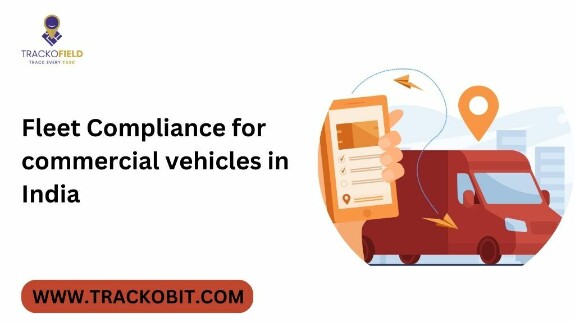Fleet Compliance for commercial vehicles in India
"In fleet management, compliance is not an option; it's a responsibility." Our country has a regulatory body that is responsible for setting compliance standards and regulations for commercial gps tracking vehicles.

This body is the Ministry of Road Transport and Highways (MoRTH). It plays a critical role in setting and updating several regulations that govern commercial vehicles including vehicle registration, permits, safety standards, emission standards, fitness certifications, etc.
Before we know about these regulations, let’s start this article by knowing about Fleet Compliance first!
What is Fleet Compliance?
Fleet Compliance refers to the adherence of fleet management software or organisations to a set of guidelines, policies and standards set by the regulatory bodies of a country or state. It aims to enhance road safety, minimise the risks associated with vehicle operations and ensure that the drivers follow eco-friendly practices. Some of the primary components of fleet compliance are mentioned below;
Key Components of Fleet Compliance
Below are some mandatory guidelines that Indian commercial vehicles must follow;
Vehicle Registration: Every commercial vehicle running on public roads must be registered under the Regional Transport Office (RTO) and must have a valid registration number.
Hours of Service (HOS): This policy is specifically designed to prevent driver fatigue and ensure the safety of your vehicles and other vehicles on the road. As per this policy, the number of hours a driver can operate a vehicle gets limited.
Bharat Stage (BS) Emission Standards: These standards set limits for various pollutants emitted by vehicles such as hydrocarbons (HC), carbon monoxide (CO) and nitrogen oxides (NOx). Manufacturers must comply with these emission norms to legally sell their vehicles in the country.
AIS-140 : Short for Automotive Industry Standard, comprises regulations released by the Automotive Industry Standard Committee (AISC) in collaboration with the Ministry of Road Transportation and Highways (MoRTH).
Safety Features: Commercial vehicles in India must be well-equipped with certain mandatory safety features including seat belts, anti-lock braking system (ABS), airbags and speed alert systems.
Pollution Under Control (PUC) Certificate: In an attempt to control the increasing air pollution in the country, all commercial vehicles must obtain a valid PUC certificate that ensures that the vehicle’s emissions are not exceeding the permitted limit.
Vehicle Identification Number (VIN): As per this regulation, every commercial vehicle must have a unique identification number that will be used for its identification and registration.
Driver Licensing: Depending on the type of vehicle they operate, commercial vehicles are supposed to hold a driving license. Different categories of commercial vehicles may have specific licensing requirements.
Insurance and Permits: As the name suggests, this regulation ensures that commercial vehicles possess the required permit for their usage.
Road Tax: According to this regulation, commercial vehicles are subjected to road tax and fees depending on their type, weight, and usage.
Consequences of non-compliance of commercial fleets
Overlooking compliances can cause huge damage to your business reputation. Penalties are just a trailer, the whole picture involves increased administrative costs, risks of going out of business or losing your chance to gain the incentives that the government offers to compliant businesses. Let’s understand them a bit in detail to gain more clarity
Penalties and Fines
Penalties for non-compliance come in multiple phases; starting with fines and limiting the overall activities of your vehicles and ending up with imprisonment. Even when you're not asked to pay penalties, any investigation by a regulatory body can cost your business a huge amount of contractor fees and damage your reputation in the market.
Vehicle Impoundment
Regulatory authorities can even impound your vehicles until the necessary regulations are followed or the fines are paid. This results in the disruption of business operations which can further affect your customer relations in the market.
Limited Access
Certain areas may require commercial vehicles to meet specific compliance standards to gain access. Therefore, non-compliance may result in limited access to these areas or projects. This further results in the loss of numerous business opportunities that may have benefitted your organization.
Conclusion
Summing up, fleet compliance is a responsibility that all organizations relying on commercial vehicles must fulfil. As we have already learned about the consequences of non-compliance. ‘It’s better to be safe than sorry’.
Plus adhering to compliances opens tons of opportunities for your business as you pave forward. Government authorities reward businesses that follow compliance by offering them incentives. So, it sounds like a win-win situation.